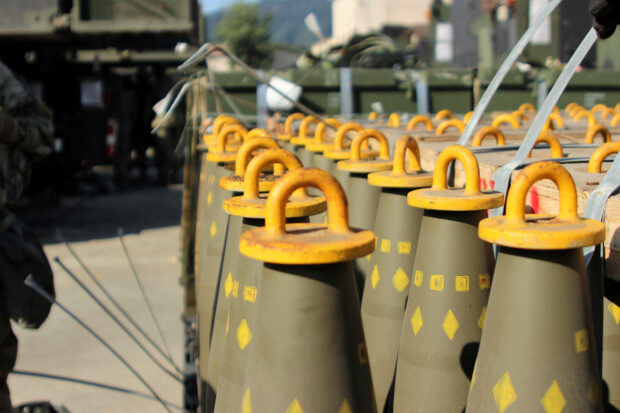Tortured path to US decision to send Ukraine cluster munitions

Dozens of 155mm Base Burn Dual Purpose Improved Conventional Munitions (DPICM) rounds wait to be loaded into M109A6 Paladin self-propelled howitzers and M992 Field Artillery Support Vehicles at a U.S. Army motor pool at Camp Hovey, South Korea September 20, 2016. U.S. Army/2nd Lt. Gabriel Jenko/Handout via REUTERS/File Photo
WASHINGTON — After months of hand-wringing and just days before the July Fourth celebration of U.S. independence, President Joe Biden’s national security team unanimously agreed to recommend he send cluster munitions to Ukraine in its war against Russia.
Kyiv long had the controversial weapons at the top of its wish list but U.S. officials were wary because the munitions release scores of bomblets to shred anything in their path, pose a danger to civilians long after fighting ends and are banned by more than 100 states under a global agreement.
Even after approving the deal to supply Ukraine, Biden told CNN it was “not an easy decision.”
Ultimately U.S. officials say they had no choice when it became apparent earlier this year that Ukraine – now waging a counteroffensive against Russia – was running out of regular artillery ammunition and production would not meet its needs.
It was this looming gap in supplies to Ukraine and assurances from Kyiv on how it would use cluster munitions that helped U.S. Secretary of State Antony Blinken overcome his humanitarian concerns and back the move, said a senior State Department official, speaking on condition of anonymity.
Article continues after this advertisementThe United States is sending Ukraine the dual-purpose improved conventional munition (DPICM) – a cluster munition fired from a 155 millimeter Howitzer cannon. The first shipments from U.S. stocks are expected to begin within weeks.
Article continues after this advertisementHuman rights groups opposed the U.S. decision to provide cluster munitions. Human Rights Watch has already accused Russian and Ukrainian forces of using these weapons, which have killed civilians.
Colin Kahl, the Pentagon’s top policy adviser, acknowledged on Monday that the U.S. government had been “agonizing” over whether to send Ukraine cluster munitions for months, given the humanitarian concerns. He said that the weaponry, however, was at the top of Ukraine’s wish list and said there were concerns that Kyiv’s counteroffensive could stall without it.
“They’ve been pushing for DPICM a long, long time. All right? This was at the very top of their list of requirements,” said Kahl, speaking at a forum in London. “We held off because it was a really hard decision, because we’ve wrestled with the moral issues, the normative issues, the humanitarian issues.”
‘Difficult decision’
The United States accused Russia of using cluster munitions with a failure rate of up to 40%, leaving the ground littered with unexploded bomblets. Washington said it is sending Ukraine cluster munitions with a failure rate of less than 2.35%.
Washington has sent Kyiv military assistance worth more than $40 billion since Russia invaded its neighbor on Feb. 24, 2022. Ukraine has been lobbying Washington for cluster munitions for months, along with some members of Congress.
Top Republicans on the Senate and House foreign relations and armed services committees wrote to Biden in March urging his administration to provide them. While some congressional Democrats objected to Biden’s decision to send the munitions, there is bipartisan support for doing so.
However, many U.S. allies and partners helping aid Ukraine are among the 111 state parties to the Convention on Cluster Munitions, which prohibits all use, stockpiling, production and transfer of cluster munitions and came into force in 2010.
Under the convention, the state parties have to notify the United States of the obligations of state parties and make “best efforts to discourage states not party to this convention from using cluster munitions.” The United States, Russia and Ukraine are not state parties.
The United States “consulted closely” with allies and partners on the cluster munitions decision, said State Department spokesperson Matthew Miller, adding that “we don’t believe that decision will impact support for Ukraine from around the globe.”
“This was a very difficult decision for the administration,” Miller said.
Britain, Canada, Germany and others have expressed to the United States their opposition to the use of cluster munitions. Biden and British Prime Minister Rishi Sunak discussed the U.S. decision when they met in London on Monday.
“We stand by our obligations under the convention, which include discouraging their use,” said a spokesperson for Sunak. “Obviously it is for each country to make a decision.”
RELATED STORIES